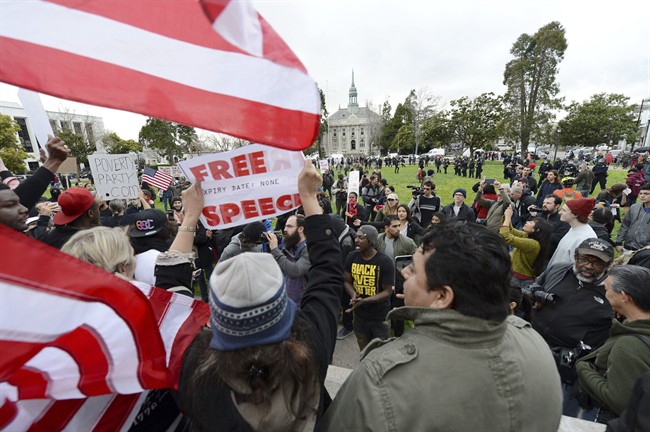Organizers pulled the plug on a planned lecture by author Ann Coulter at the University of California, Berkeley this week. This is only the latest example of speakers — generally conservatives — being shut down by riots or the threat of violent protest.

It was only in February that Berkeley was literally aflame after hundreds of “anti-fascist” protesters took to the streets in opposition to Milo Yiannopoulos.
The conduct was reprehensible, but so was that of the 100 faculty members who called on Berkeley to cancel the event, citing the offensive nature of Yiannopoulos’ schtick.
Many of these professors have tenure, protecting their right to be controversial. Not as important for others, apparently.
Universities were once bastions of free speech, but genuine dialogue has been replaced by vicious shouting matches and conformity enforced by mob rule. This is particularly sobering at Berkeley, given its long-standing support of free expression.
Anyone caught off guard by this incursion of censorship hasn’t been paying attention: We were warned.
READ MORE COMMENTARY: The only surprise in Milo Yiannopoulos’ flameout was how fast it happened
- Life in the forest: How Stanley Park’s longest resident survived a changing landscape
- ‘Love at first sight’: Snow leopard at Toronto Zoo pregnant for 1st time
- Buzz kill? Gen Z less interested in coffee than older Canadians, survey shows
- Carbon rebate labelling in bank deposits fuelling confusion, minister says
This month marks the 30th anniversary of Allan Bloom’s renowned book, The Closing of the American Mind: How higher education has failed democracy and impoverished the souls of today’s students.
Published in 1987, the book lamented the dilution of education and decline of discourse at post-secondary institutions — witnessed firsthand by Bloom, a classics professor and philosopher.
As the culture changed in the 1960s with the sexual revolution, anti-war protests and the rise of feminism, so too did the attitudes of that era’s students, in particular. Universities capitulated to the demand for education that was more rooted in social justice than objective truths.
This didn’t just manifest itself in political theory, but even the arts. Students were more concerned with discrediting, rather than studying, classics (on account of undertones of sexism and racism, invariably). Not even works by Shakespeare, Homer and Aristotle were safe.
Challenging truth and authority is a part of education. Campus progressives wanted their view unchallenged.
Universities responded, Bloom noted, by “offering every concession other than education,” saying “the whole experiment in excellence was washed away, leaving not a trace.”
As cultural relativism, the belief system that rejects any sense of cultural superiority (certainly that of the West) became the norm, students rejected quintessential Western values like free speech.
Despite being the mother of all liberties, free speech was lumped in with any other theory of mythology, viewed as a novel idea rather than a necessary tenet of democracy.
And so began the death of debate.
More than a generation after The Closing of the American Mind, disrespecting free speech is part of progressive doctrine.
Instead of countering controversial opinions with opposing views, it’s more the norm to protest a speaker or try to shut them down altogether.
Student unions routinely block assembly by groups challenging liberal orthodoxy.
Speech codes to guard against allegedly oppressive language are ubiquitous on campuses.
Without ever using the term “political correctness” or “safe space,” Bloom described what is so apparent in academia, and even off-campus, today. He was ahead of his time.
As a concept, political correctness was in action in the 1980s, but not as mainstream or understood as it is today.
It was actually a 1993 Newsweek feature that blew up the national discussion in America about the PC phenomenon, which the author termed, “an experiment of sorts taking place in American colleges.”
The piece shared stories that were unbelievable at the time.
A University of Connecticut student was excommunicated by her school for a tasteless joke about gays. She was later allowed back, but only after a federal lawsuit.
A Brown University student insisted the school refer to young girls as “pre-women,” to avoid belittling them.
Smith College issued a notice informing students of the 10 kinds of oppression they should avoid — from ageism to ableism to heteronormativity.
It’s laughable today to think these were controversial. Stories like these are now the rule, not the exception.
As much as Bloom’s book sent shockwaves through academia, his concerns weren’t heeded by the tenured Marxist professors and peacenik students who tended to run the show.
Idealism was partially to blame, Bloom argued.
In 1987, most college-aged students had a relatively good life. They had more personal freedoms than their parents did, and they didn’t have to live in fear of the Second World War or Vietnam War drafts.
Even the Cold War threat of nuclear attack had waned.
No one can argue, 30 years later, that things are better.
Perhaps Bloom’s hopefulness was his book’s biggest failing. He looked to the purity of the philosophical discourses in ancient Greece — the Platonic and Socratic dialogues — as model examples, stating that such a return to a culture of ideas and values is always viable.
It seems less so with each passing riot.
Andrew Lawton is host of The Andrew Lawton Show on London’s AM980 and a commentator for Global News.








Comments